6 Benefits Of An Overnight Hair Mask, How To Use, & Recipes
Get your hair conditioned and nourished with these powerful, all-natural ingredients.
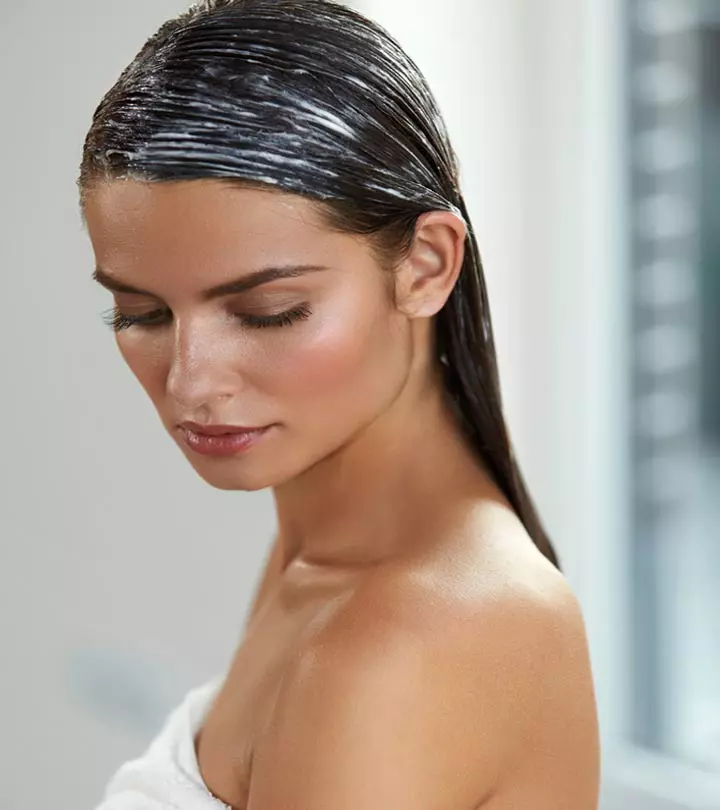
Image: Shutterstock
Many factors like pollution, chemical hair treatments, or stress can make your locks dry, brittle, and lifeless. Regular hair masks offer lost moisture to your hair and soften your tresses. Overnight hair masks can be particularly effective in addressing issues like dryness, frizz, and damage, offering deep conditioning and repair while you sleep. But what are overnight hair masks? Are they safe to use? Not all hair masks are available in the same formulas. While you need to keep some on your hair for minutes before washing them off, others can be worn overnight for effective results.
However, remember that not all hair masks are designed to be left on your hair overnight. Some may even lead to hair breakage due to certain ingredients. Hence, getting the right information about overnight hair masks is key.
 Quick Tip
Quick TipThis article explores the benefits of overnight hair masks, how to use them, and how often you should use them. Take a look.
In This Article
Benefits Of An Overnight Hair Mask
The benefits of an overnight hair mask depending on the kind of ingredients it is made of. However, there are a few benefits that you can expect from almost all overnight hair masks. Keep in mind that no scientific research has been conducted to prove the same:
1. Intense Moisturization
Having a layer of nutrients from the roots to the tips overnight gives a lot of time to your hair to absorb all the nutrients and deep moisturization. The overnight hair mask ingredients are said to coat the hair follicles and retain the moisture inside the hair to offer improved shine.
2. Frizz Control
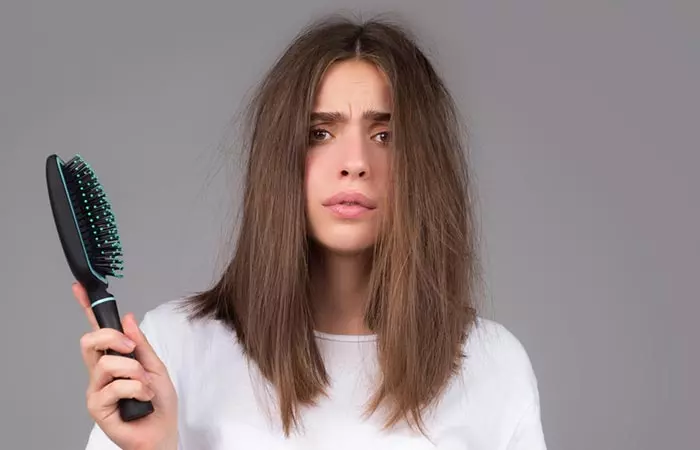
An overnight hair mask helps in improving the texture of your hair. It helps in keeping your hair tame and frizz-free. Applying any moisturizing mask helps your hair adhere to its natural flow and not get excessively frizzy. An overnight hair mask makes this adherence last for extended periods.
3. Improves Hair Health
In general, an overnight hair mask is supposed to have nutrients that your specific hair type lacks. With the help of these nutrients, the overnight hair mask will target your hair’s problems. The mask works towards making your hair healthier by giving it extra nourishment. Depending on what the main ingredient of your overnight hair mask is, it can improve your hair’s quality in different ways. For instance, an egg yolk-based mask will contain vitamin E. This antioxidant reduces hair damage (1). Vitamin E also reduces free radicalsi Volatile and reactive atoms that are a byproduct of regular metabolism and can harm cells, resulting in disease and aging. on the scalp that slow growth.
4. Deep Conditioning
An overnight hair mask provides deep conditioning by allowing the nourishing ingredients to penetrate the hair cuticle for an extended period. This extended exposure helps repair and moisturize dry, damaged hair. It also leaves hair feeling softer, smoother, and more manageable.
5. Reduce Hair Loss
Using overnight hair masks to treat hair loss is a popular home remedy. However, there is limited scientific research to substantiate their effectiveness. While these masks can deeply condition and moisturize hair, no specific studies confirm their direct role in hair loss prevention. Nevertheless, you can make them a part of a comprehensive hair care routine, alongside other proven strategies that address hair loss.
6. Reduces Tangles
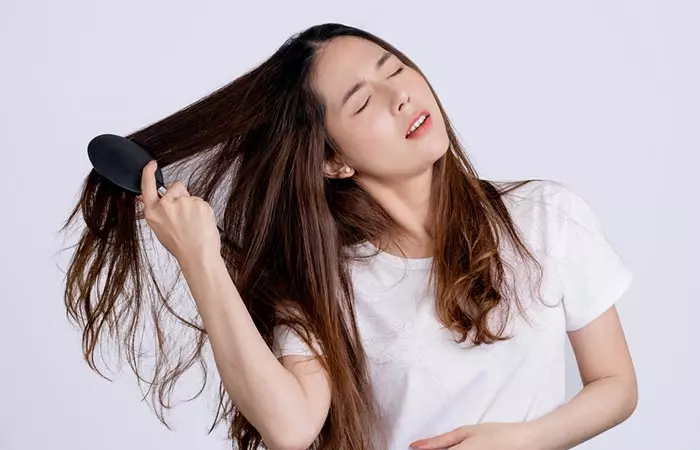
Just the way conditioner makes your hair soft and tangle-free, an overnight mask also helps detangle the hair and make it easy to comb. Though applying an overnight hair mask has multiple benefits, are all of them safe for your hair? We discuss the risk factor that comes with using these hair masks in the next section.
Key Takeaways
- Overnight hair masks provide essential nutrients, hydrate your hair, and improve your overall hair health.
- Making overnight hair masks with protein or apple cider vinegar can strip your hair of protein and leave it dry and brittle.
- Applying hair masks with bananas for dry hair and aloe vera for wet hair twice a week will help with hair strengthening and make it smooth and shiny.
Are Overnight Hair Masks Safe?
Hair masks are supposed to be good for your hair. However, when you keep them on overnight, you increase the chances of adverse reactions on the scalp. This may lead to hair damage.
The most crucial factor is to be fully aware of the ingredients in the overnight mask. Certain ingredients can be helpful if used for a specific amount of time. If you cross that time, they can harm your hair.
Read on to find out how different ingredients affect your hair, and make a hair mask choice accordingly:
1. Overnight Hair Masks With Protein
Protein is a great ingredient that helps with hair growth. However, there is a limit to it as well. Avoid using protein-rich ingredients in your overnight hair masks as it is claimed to lead to hair breakage. If your hair receives an excess of protein, but the moisture it receives is not enough, there is a considerable possibility of the hair follicles becoming brittle and causing hair fall. However, there is no scientific evidence to prove the same.
Note: Protein masks shouldn’t be used more than once every 8 weeks. When keratin protein, which is in each hair strand, is reduced, a protein mask is helpful. However, if you already have protein in your hair and add more, it will take up more space inside the hair strand and stretch it from the inside out. This creates a bulge under the cuticle, and that is when it breaks easily.
 Quick Tip
Quick Tip2. Overnight Hair Masks With Apple Cider Vinegar
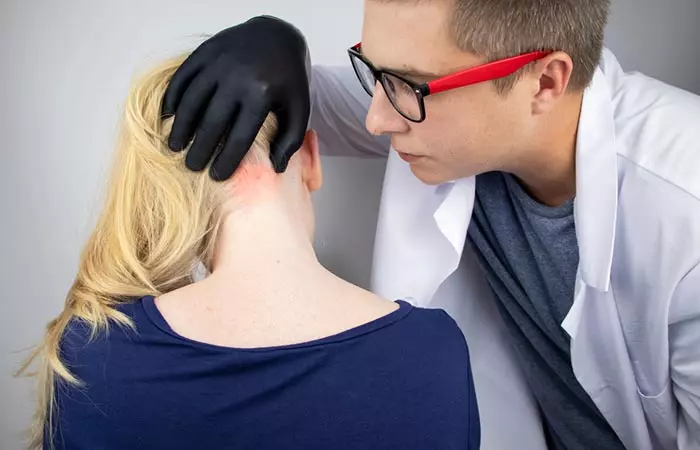
The hair care community knows apple cider vinegar for its ability to make your hair shiny. However, apple cider vinegar has a low pH which makes it highly acidic. Keeping it on the hair for a prolonged period can strip away your hair’s protein. Additionally, exposing your scalp to any acid for a prolonged period can lead to scalp burns.
3. Overnight Hair Masks With Egg
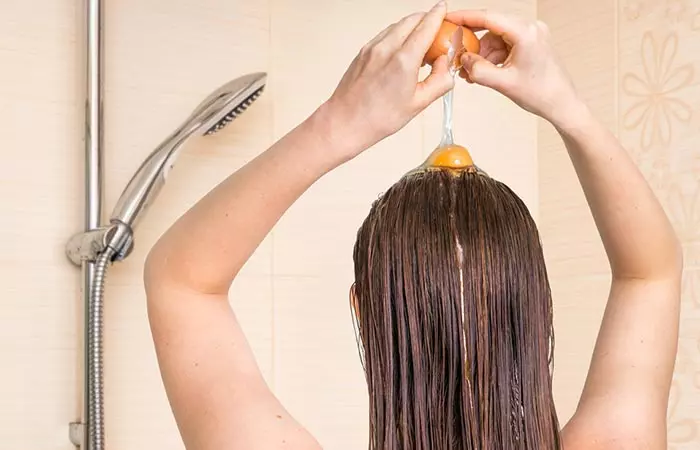
It is best to avoid ingredients like an egg as it can impart a foul odor to your hair when you keep it on overnight. It also runs the risk of bacterial or fungal development that could occur because of the hair mask’s overnight application. It may be beneficial for the hair if used for a shorter time. Additionally, if you have an egg allergy, you should stay away from an overnight hair mask that contains eggs.
Now that you know what kind of ingredients you have to stay away from in an overnight hair mask, keep reading to find out what kind of ingredients you can use on different types of hair.
Overnight Hair Mask For Dry, Frizzy Hair
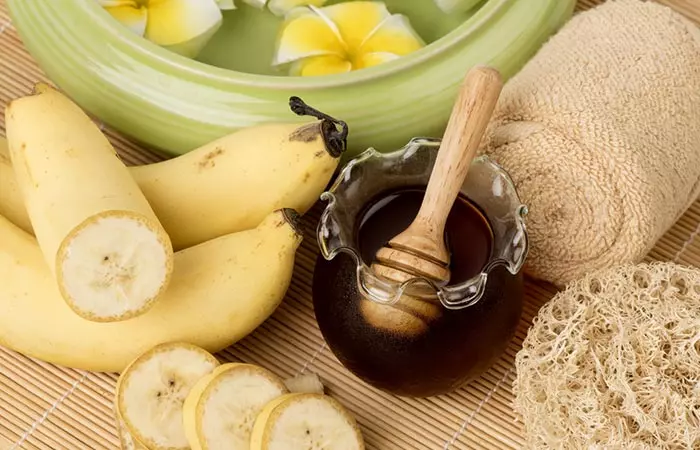
If your hair is dehydrated and gets frizzy often, you must use an overnight hair mask containing moisturizing ingredients to hydrate and restore it. If you want to add moisture to your hair, two great ingredients are banana and honey.
Bananas contain silicai A mineral that nourishes your hair follicles with vital nutrients to strengthen your hair and prevent thinning. . Silica is used in many hair conditioners to reduce frizz (2). Honey is an excellent hair-conditioning agent that adds moisture to your hair. It also contains vitamins and minerals that can further strengthen your hair, thus helping in hair rejuvenation (3).
What You Need
- 1 tablespoon honey
- 1-2 ripe bananas
What To Do
- Mash the bananas with a fork. Use one or two bananas, depending on how long your hair is.
- Add the honey to the mashed bananas.
- Blend this mixture until you get a smooth paste.
- Start from the scalp and apply the overnight hair mask up to the tips of your hair.
Note:
Banana is very difficult to rinse from the hair. Hence, it is better to use banana water with honey. Boil the banana and the peel, strain the liquid, add honey until it is dissolved, and wait for the mask to be cool enough to be applied on the hair as an overnight mask.
Read on to know what sort of ingredients you need for an overnight mask for damaged hair.
Overnight Hair Mask For Damaged Hair
If you have an outdoor work environment or style your hair often, your hair can undergo significant damage. If you take care of your hair regularly, you can stem the progress of the hair restoration to its natural texture. Two primary ingredients that can help alleviate hair damage and help with hair repair are coconut oil and aloe vera.
Aloe vera and coconut oil hair masks are popularly used for combating damaged tresses owing to their potent components. Coconut oil has a low molecular weight and is easily absorbed into the hair follicles. Additionally, it is integral to use coconut oil if you wish to stop protein loss from your hair (2). On the other hand, aloe vera contains antioxidants, enzymesi Proteins that serve as biological catalysts and aid in speeding up metabolism or chemical reactions that occur in our bodies. , fatty acids, and vitamins that can ensure a healthier scalp (4).
What You Need
- 2 tablespoons aloe vera gel
- 2 tablespoons non-refined coconut oil
What To Do
- Take the two tablespoons of coconut oil in a glass bowl and microwave it till it is warm.
- Add the aloe vera gel to the oil.
- Stir the ingredients until the consistency of the paste is uniform.
- Apply the paste from the scalp to the tips of your hair.
Tia, a YouTuber, tried using aloe vera gel on her hair overnight for a DIY natural hair treatment. She showed how she prepared the gel and applied it to her hair while discussing the potential benefits of aloe vera for hair health. After leaving the gel on overnight and washing it off in the morning, she noted that her hair felt moisturized, conditioned, thicker, and softer. She said,” It’s basically meant to keep your hair healthy in the long term as well with long-term use. It’s also meant to keep your hair healthy, which in turn results in faster hair growth (i).”
Now that you know how to make overnight hair masks, let’s talk about how to use hair masks and what benefits they can bring to the table. Read the section below.
How To Use An Overnight Hair Mask
After you have selected the right kind of overnight hair mask for your hair problems, it is time to ensure that you apply it correctly.
- Wash Your Hair: Wash and condition your hair like you usually do.
- Dry It Partially: Use a microfiber towel or a soft T-shirt to wring out the extra water from your hair. Do not use a blowdryer as your hair needs to be damp when applying the mask.
- Apply The Mask: Divide your hair into sections with a comb. Use clips or hair ties to keep them apart. Unclip one section and start applying the hair mask to it, starting from the roots and moving down to the tips. Repeat this process until you have applied the hair mask to all the sections of hair.
- Comb Your Hair: Once you have covered every inch of your hair and scalp with the overnight mask, use a wide-toothed comb to spread the mask evenly.
- Secure Your Hair: Put on a shower cap to keep all your hair in place. You can pin up your hair if you have long hair. Lay a towel on top of your pillow before you go to sleep to avoid staining it.
- Wash Your Hair: The next morning, wash your hair with plain water. Make sure you wash off the mask completely.
- Dry Your Hair: Dry your hair with a soft towel. Style it as usual.
So how often should you be using these masks? Read on to find out!
How Often Should You Be Using An Overnight Hair Mask?
If your hair is dry or damaged, you could benefit from using an overnight hair mask once or twice a week. While you regularly apply this mask, keep track of any scalp or hair issues that come up due to overuse or buildup on the hair from the mask. If you feel itchiness or thinning in your hair, stop using the overnight hair mask.
If your hair is oily but not damaged, you do not need to use an overnight hair mask as often. Restrict use to once every two weeks.
If you have been using an overnight hair mask for a few months but do not see a change in your hair texture or any damage reduction, you should consult a dermatologist. Do not try to increase the concentration of ingredients in the hair mask.
Wondering what happens if the mask is left on for too long in your hair? Find out below!
What Happens If You Leave A Hair Mask On Too Long?
When you use an overnight hair mask that you bought off the shelf, you should make sure you use it as per the directions for use. Keeping it on for too long can potentially make your hair brittle and susceptible to breakage. If you make the overnight hair mask at home, make sure to use mild ingredients and not keep it on longer than overnight.
Infographic: Key Ingredients For Healthy Hair
Masks help boost hair hydration with nourishing oils, different kinds of plant butter, and other ingredients. With the right mix of ingredients, it is possible to achieve this moisturization naturally.
Discover what these beneficial ingredients are and what they can do for your tresses by checking out the infographic below. Illustration: StyleCraze Design Team
Overnight hair masks offer numerous benefits. They provide intense moisturization, effectively control frizz, and reduce tangles. However, it is highly recommended to know the ingredients of the masks in detail before using them, as a few of them may negatively affect hair health. For example, hair masks with apple cider vinegar, protein, and egg should be avoided overnight as they may damage the hair. Applying a hair mask to clean hair improves its effectiveness. You can use these masks once or twice a week. Try any of the above-mentioned overnight masks for healthy hair.
Frequently Asked Questions
Can I leave castor oil in my hair overnight?
Depending on your hair type and needs, you may do that. Castor oil is low on the comedogenic scalei A scale that indicates the potential of a substance, such as oil or butter used in the formulation of cosmetic products, to clog pores. , so it won’t clog your pore if left overnight in the hair. You can apply it for long hours if you have dry hair and need extra hair nourishment.
Can I leave curd on my hair overnight?
While curd is a natural and nourishing ingredient for hair, leaving it on your hair overnight is not recommended. The prolonged exposure to curd can lead to sour-smelling hair, which may be difficult to wash out. Additionally, the acidic pH of curd can potentially disrupt the natural pH balance of the scalp and lead to irritation or dryness. However, you can still benefit from using curd as a hair mask by leaving it on for a shorter period of time, such as 30 minutes to an hour.
How long does it typically take to see results from using an overnight hair mask, and are there any risks or side effects to be aware of?
The results of using an overnight hair mask can vary depending on the individual and the specific mask used. However, in general, you may start to notice some benefits after just one use, such as softer, smoother, or more manageable hair. For more significant or long-lasting results, it’s recommended to use an overnight hair mask regularly, such as once or twice a week, for a few weeks or months.
What other steps can you take to keep your hair healthy and nourished, in addition to using an overnight hair mask?
There are several steps you can take to keep your hair healthy and nourished in addition to using an overnight hair mask:
• Follow a healthy diet
• Choose a mild or sulfate-free shampoo that won’t strip your hair of its natural oils.
• Use a conditioner after shampooing to help nourish and protect your hair.
• Try to limit heat styling or use a heat protectant spray.
• Protect your hair from the sun by wearing a hat or using a hair product with SPF protection.
• Get regular trims to remove split ends and prevent breakage.
• Avoid tight hairstyles that can pull on your hair and cause breakage.
Illustration: Benefits Of An Overnight Hair Mask, How To Use, & Recipes
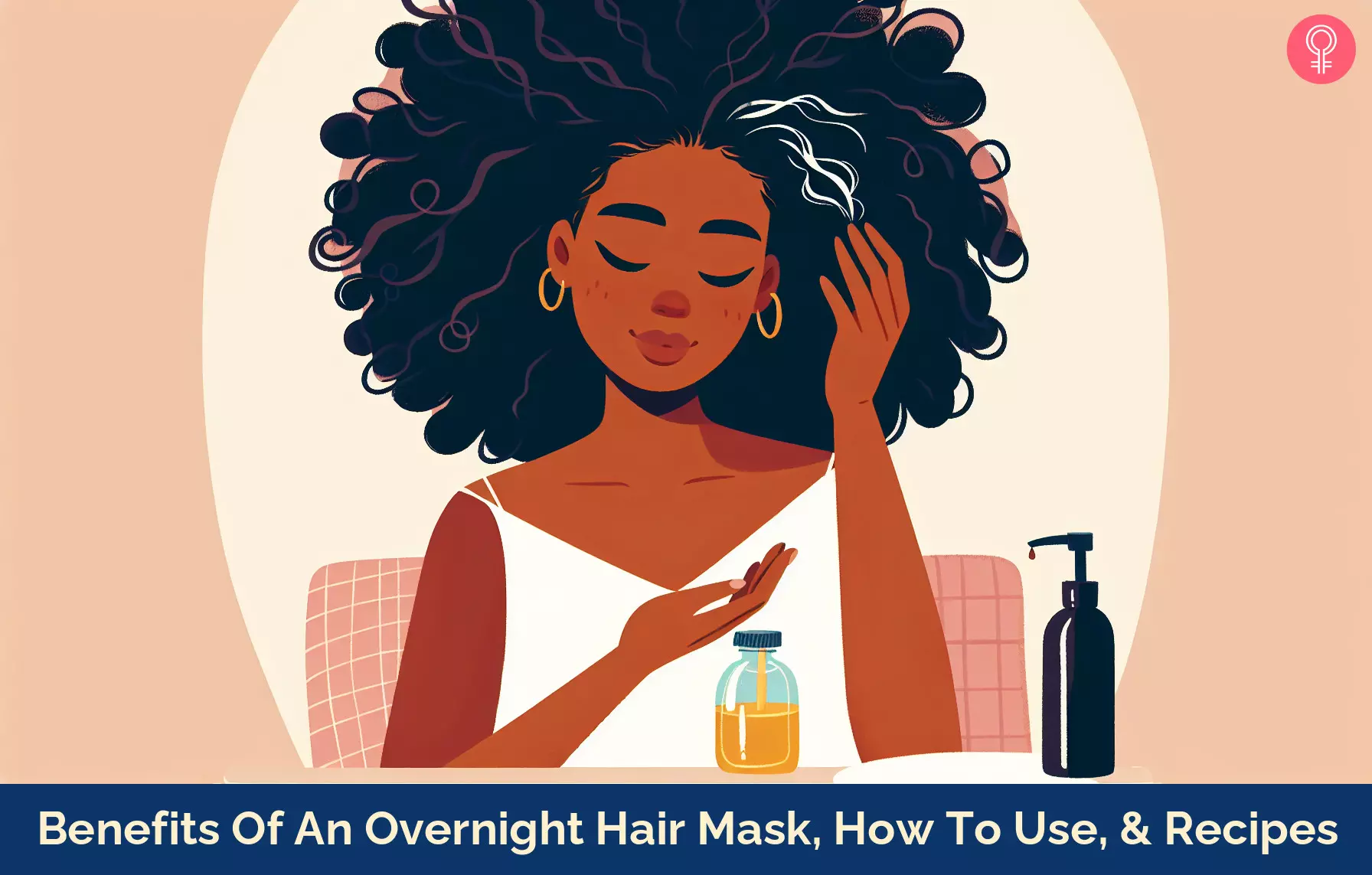
Image: Dall·E/StyleCraze Design Team
Learn how to use a hair mask from a clinical expert for best results! Discover the best tips and tricks to keep your hair looking healthy and beautiful in the video below. Check it out now!
Personal Experience: Source
StyleCraze's articles are interwoven with authentic personal narratives that provide depth and resonance to our content. Below are the sources of the personal accounts referenced in this article.
i. I left aloe vera in my hair overnight & this is what happened (hair growth & thickness)https://www.youtube.com/watch?v=HZB9crK8B4Q
References
Articles on StyleCraze are backed by verified information from peer-reviewed and academic research papers, reputed organizations, research institutions, and medical associations to ensure accuracy and relevance. Read our editorial policy to learn more.
- Effects of Tocotrienol Supplementation on Hair Growth in Human Volunteers.
https://www.ncbi.nlm.nih.gov/pmc/articles/PMC3819075/ - Hair Cosmetics: An Overview.
https://www.ncbi.nlm.nih.gov/pmc/articles/PMC4387693/ - Medicinal and cosmetic uses of Bees Honey A review
https://www.ncbi.nlm.nih.gov/pmc/articles/PMC3611628/ - Aloe Vera: A Short Review.
https://www.ncbi.nlm.nih.gov/pmc/articles/PMC2763764/
Read full bio of Madison Dufour
Read full bio of Arshiya Syeda
Read full bio of Ramona Sinha
Read full bio of Medha Deb







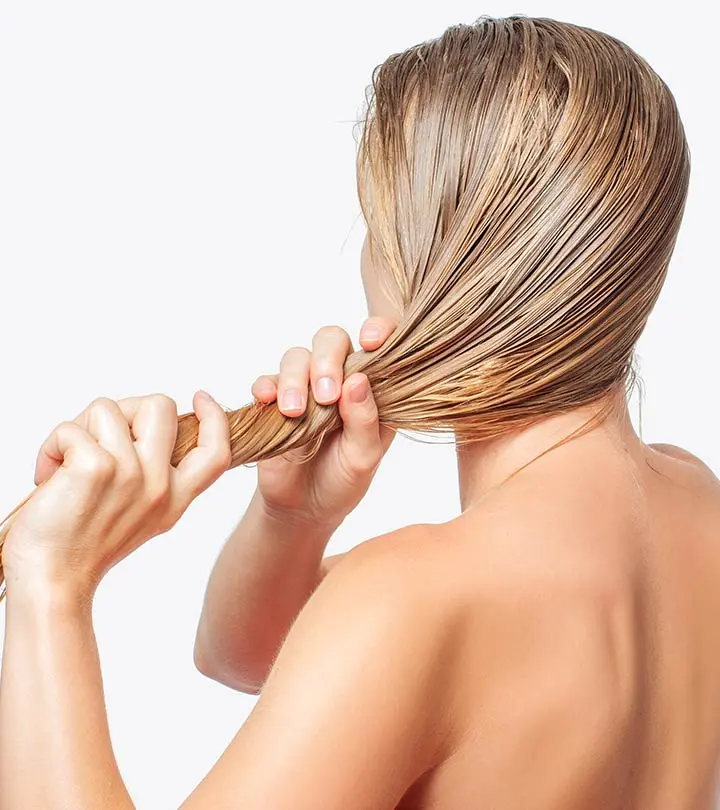




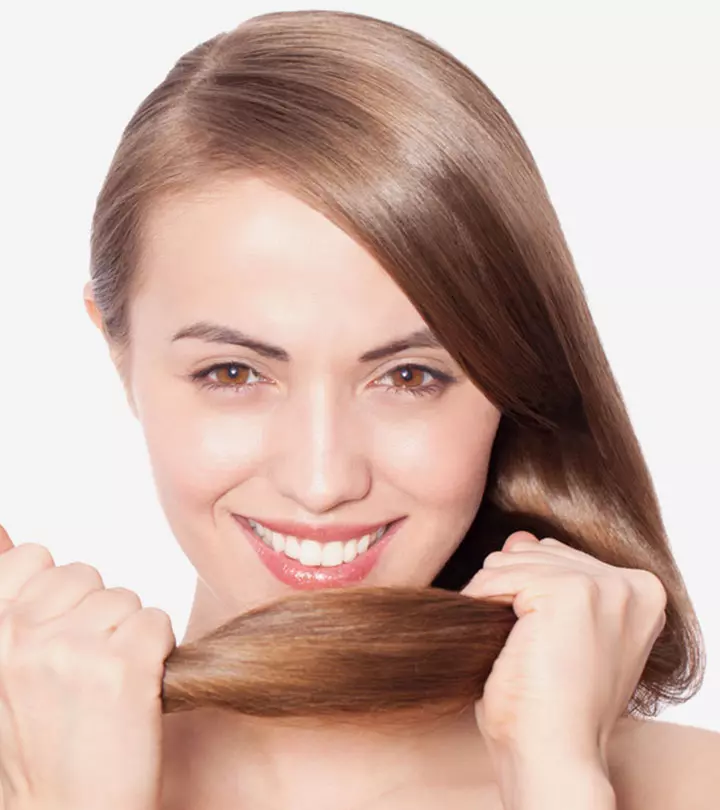
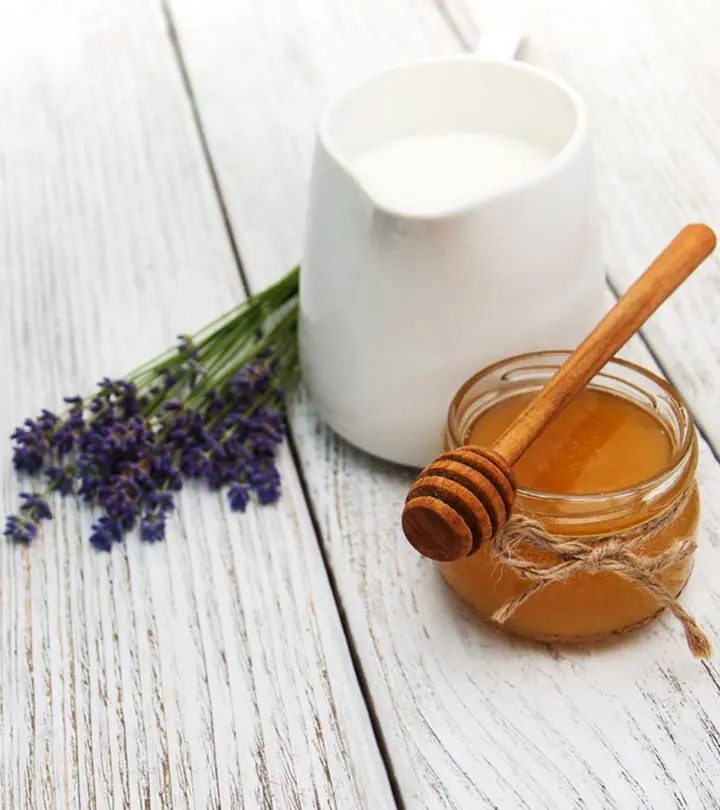
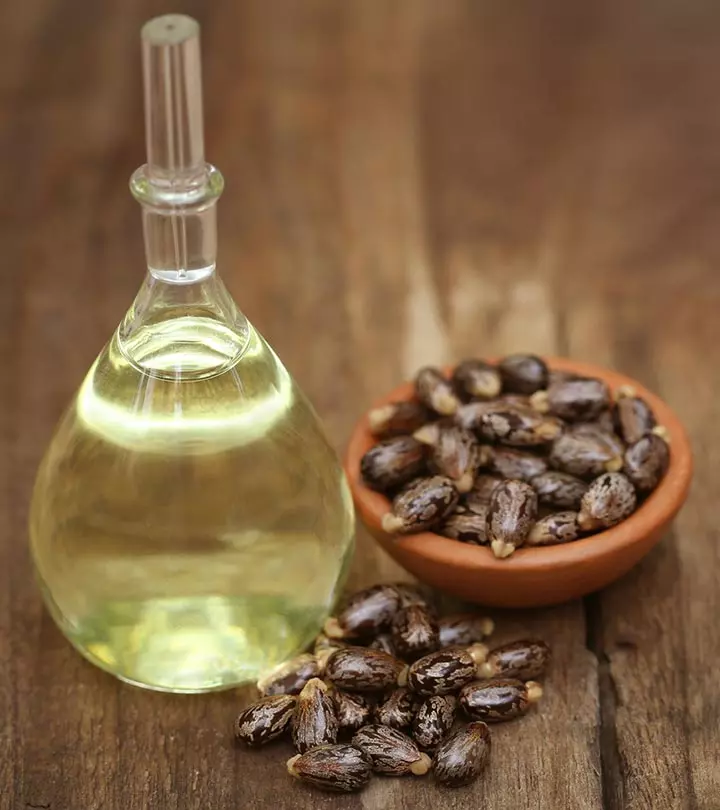
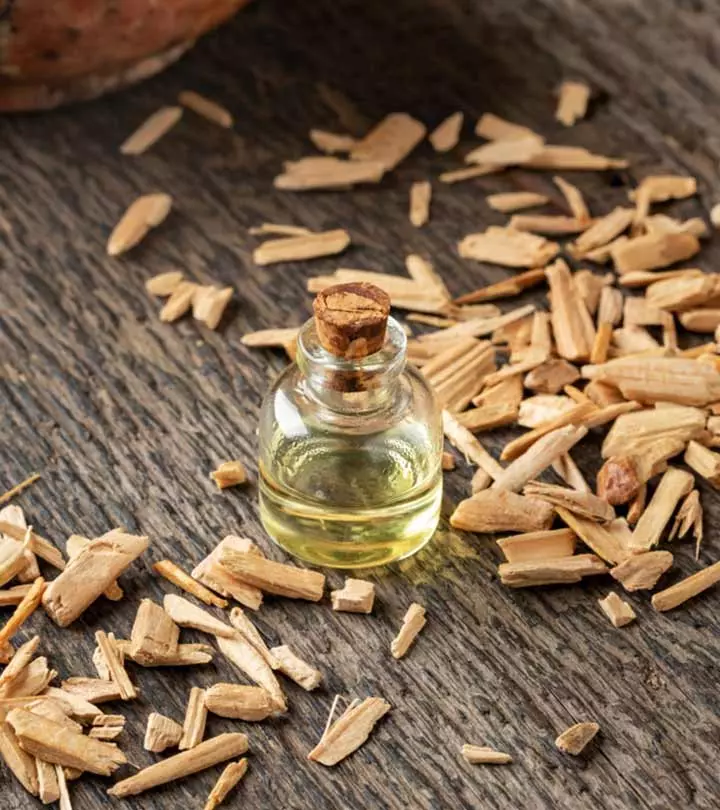
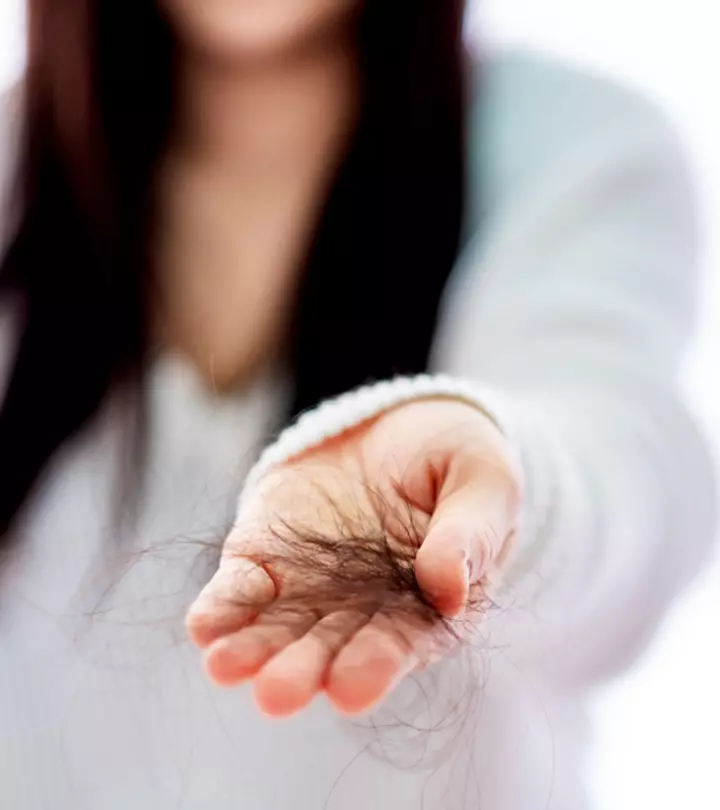

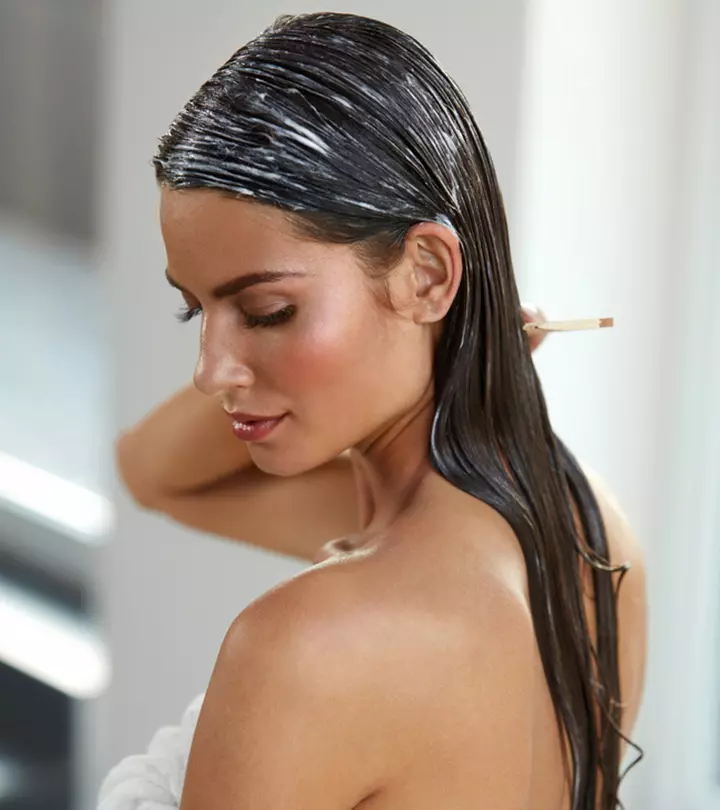
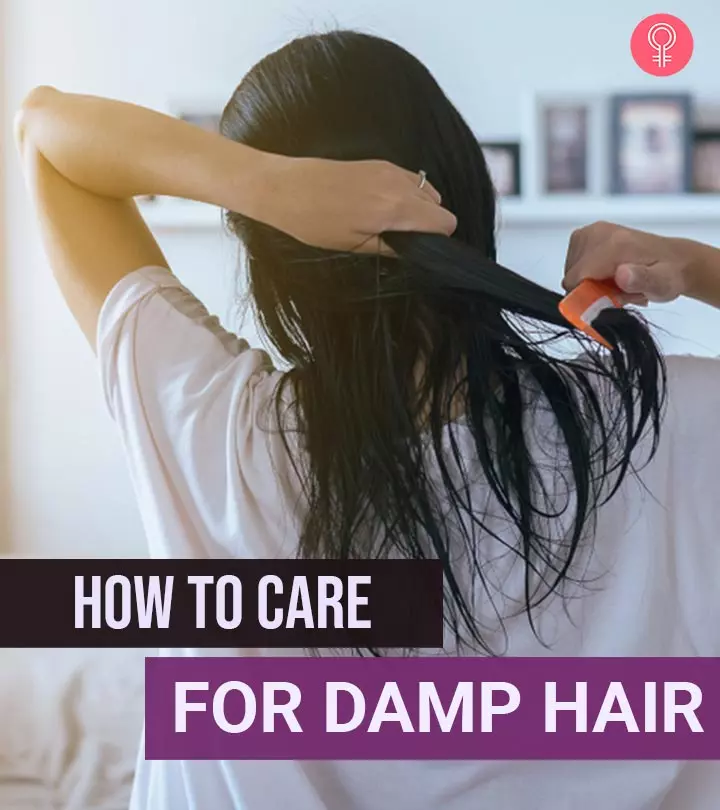
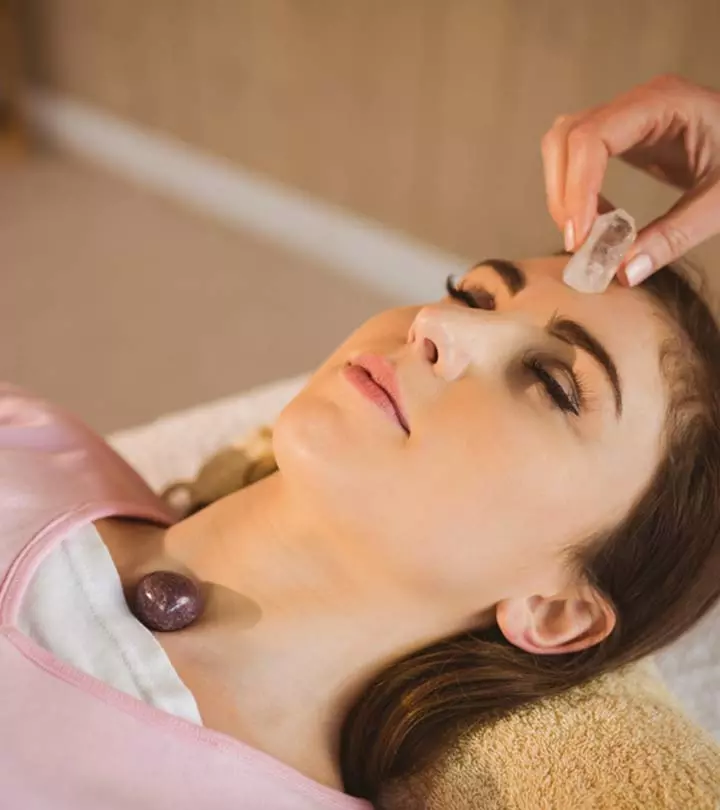


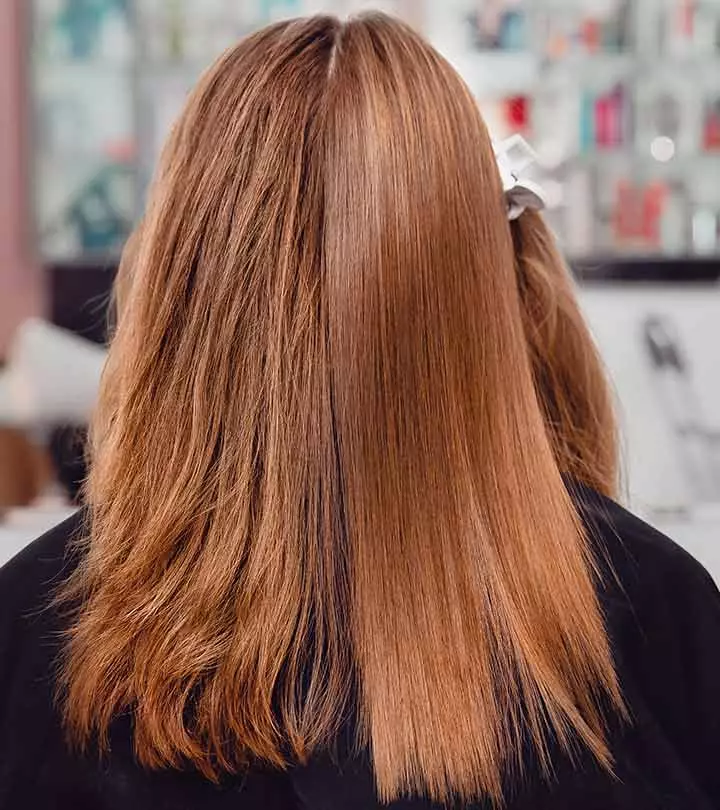
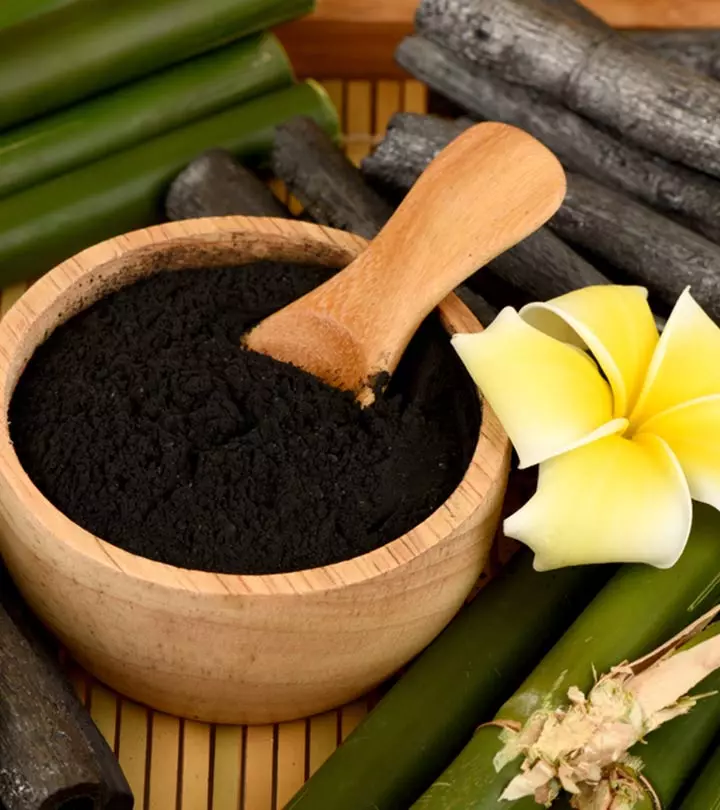


Community Experiences
Join the conversation and become a part of our empowering community! Share your stories, experiences, and insights to connect with other beauty, lifestyle, and health enthusiasts.